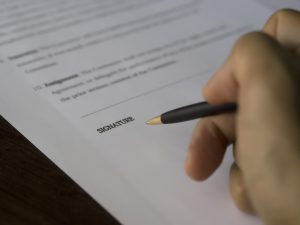
by Paul Pedigo | Nov 8, 2021 | Intellectual Property, Trademarks
Refusals to register a mark based on likelihood of confusion with a preexisting registration or earlier filed application can be difficult, especially where the marks are identical or otherwise confusingly similar and the goods or services are closely related. If the owner of the cited registration or application has stopped using its mark in commerce and has no bona fide plans to resume use of the mark in the reasonably near future, then you may be able to successfully cancel the registration or to have the owner voluntarily do so. Another potential option is to continue to use the mark in the absence of registration and to continue to build common law good will in the mark so long as an infringement action does not seem likely. Yet another potential option that may be viable in some instances, where the parties can avoid a likelihood of confusion and take steps to correct consumer confusion in the market place if it occurs, is a consent agreement. Some of these options require alerting the senior user to your presence in the market place, which is a consideration that must also be carefully considered.
“Likelihood of confusion” refers to that legal standard whereby the ultimate consumer of goods or services in the marketplace, when viewing one mark and recalling another, not necessarily in a side-by-side comparison, is likely to be confused as to whether the source of goods or services in each instance is the same or different. The U.S. Patent and Trademark Office seeks to protect consumers from likelihood of confusion as to source and to grant enforceable rights to trademark owners to preclude others from using marks that erode established trade identities. The relatively recent rise of the craft beer phenomenon has given rise to some interesting trade rights considerations that otherwise typically do not come up.
For example, none of us would presume that famous brands like Budweiser® or Coors® for beer would permit their marks to be used on anything else, whether related to beer or not, without facing the strong arm of the law. Craft beer is a little different. First, there are lots and lots of them, seasonal and year-round beers, with as many different brands, and new breweries and brands popping up on a regular basis. Second, the Trademark Office regularly rejects applications for trademarks for beer or wine where a senior user has a pre-existing application or registration for the other beverage.

I rescued an American Pitbull mix named Oberon (also an ode to the Shakespearean fairy King in “A Midsummer Night’s Dream) a year or so ago and have enjoyed Oberon® ale made by Bell’s Brewery in Michigan with his trainer over Oberon’s success in receiving his certificate of canine obedience and discipline. Recently, at a local restaurant, I ordered wine with dinner and to my surprise was served an Oberon® Napa Valley cabernet from the Michael Mondavi family. Was I confused? Not at all. The USPTO allowed the two registrations to coexist and to overcome an otherwise final 2(d) refusal because the two owners were sufficiently disciplined to file and maintain a co-existence and consent agreement in obedience to Trademark Office requirements. They agreed the marks were used on distinctive products and served distinctive commercial purposes, that the trade dress was distinct, and that the commercial impressions created were distinct. The parties also noted a history of peaceful co-existence and agreed to cooperate and to take all reasonable measures if confusion developed in the future. They recognized each other’s rights.

If you have trademark questions, either about likelihood of confusion or regarding your business IP, contact Pedigo Law Firm.

by Paul Pedigo | Jul 25, 2018 | Intellectual Property, Patents, Trademarks
Your Intellectual Property lawyer should ask several initial questions so that he or she can best serve your needs. IP legal counseling services became somewhat commoditized after the 2008 recession. Your lawyer is your advocate, on your side. His or her hard questions, although difficult to address, are designed to reduce misconceptions and to provide legal services to suit your needs. Consumers drive the price of counseling services in today’s market, yet few understand in depth what they are buying. Coupled with the ability to negotiate low prices for volume work or simply to choose among a variety of services, the IP consumer may purchase a compromised product only to regret it at a later date.
 What property have you created? Proprietary IP potentially can be protected by any of several types – utility, design, or plant patents, trademarks, copyrights, trade secrets, and know-how among them. Determining the approach is critical. It is important to understand what each of these forms of protection can and cannot do for you and to know which among them is best suited to your needs and the property you have created.
What property have you created? Proprietary IP potentially can be protected by any of several types – utility, design, or plant patents, trademarks, copyrights, trade secrets, and know-how among them. Determining the approach is critical. It is important to understand what each of these forms of protection can and cannot do for you and to know which among them is best suited to your needs and the property you have created.
Who owns the property? Failure to correctly assess ownership can be fatal to certain types of IP, including federal trademark registration, and can negatively impact the patentability of inventions. Getting ownership wrong can be a very costly mistake, the damage from which may not show up for some time.
Can use of your IP infringe the superior rights of others? Related to both the type of property and its ownership, this question seeks to determine whether you are willing to undergo the cost of a clearance search and legal opinion about the potential consequences of placing your IP into the marketplace. Neither patents nor trademarks offer a positive right to do anything, only to stop others from using yours.
What does “IP protection” mean to you? Patents and trademarks, for example, can provide a barrier to entry to competitors – a powerful tool in the market place. A common misconception is that “protection” means no one else can practice the invention or use your trademark. Obtaining the IP, although significant and necessary, is only the first step in the right to exclude. You must also enforce your IP against infringers, which typically is of far greater cost than obtaining the IP. If obtaining the IP is all you can muster, then it is appropriate to ask whether you need it. One solution is to license valuable IP to a company of a size to enforce it.
 Why do you need the IP? Sometimes clients misunderstand the value proposition in maximizing IP assets. Even for fixed fee services, time is still a factor and value is a factor of the services performed. The “diamond in a lump of coal” approach to maximize assets while minimizing expenses typically produces only coal. It is important to know the endgame, to remember that you are purchasing services to provide a custom product, and that the product is an intangible, not a tangible asset like a parcel of land backed by a deed or an automobile backed by a warranty.
Why do you need the IP? Sometimes clients misunderstand the value proposition in maximizing IP assets. Even for fixed fee services, time is still a factor and value is a factor of the services performed. The “diamond in a lump of coal” approach to maximize assets while minimizing expenses typically produces only coal. It is important to know the endgame, to remember that you are purchasing services to provide a custom product, and that the product is an intangible, not a tangible asset like a parcel of land backed by a deed or an automobile backed by a warranty.
How long do you plan to use the IP? Trademark rights are established in use, so if you do not use the mark over a significant time to establish a source-identifying function, then obtaining a trademark registration may not be worth much. Patents can take years from filing to issuance, so if the market for your product is short-lived, then patent protection may not be the best option.
Are you seeking investment capital for your business based on the IP? If so, be aware of and carefully comply with disclosure requirements, particularly where securities are offered, and be wary of disclosures that could compromise future IP rights.
What are your budget constraints and what is it you are not getting for your budget? As important a business tool as is a budget, a more important matter may be to know what you aren’t getting for the budget you provide. Your lawyer should explain to you the various options and the potential consequences. Unlike a tangible asset, you cannot replace a species of IP and there are many matters that cannot even be repaired if a problem develops after an application for protection has been made.
Multiple forms of IP protection, including multiple patents and trademarks can build a fence and provide a significant barrier to entry for competitors. Barrier to entry is much harder to maintain with only one or a few properties, yet it is also true that many aspects of IP cost money to protect but do not provide a direct return on that investment unless there is a market. It is important to carefully assess both a property and the market to determine value before making an investment.
If you are interested in speaking with an IP Attorney, these highlights will help you know exactly what to expect. Contact Pedigo Law to see what IP protection would mean for you.

by Paul Pedigo | Jun 26, 2018 | Intellectual Property, Patents, Trademarks
How is coming up with a brand for my business related to intellectual property? Profoundly, if you want to avoid costly trouble down the road. Skipping the formalities will potentially invite more hardships.
 By “branding a business,” most people mean selecting a name for the business, a trade name, that sets the business apart and identifies the business. When used on goods or for advertising services, then a word, name, symbol or device can also develop trademark significance. In either event, the standards for infringement are the same: does your use of the trade name or trademark create a likelihood of confusion among the relevant public for your goods or services? The marks don’t have to be identical, and the similarities are typically more important than the differences.
By “branding a business,” most people mean selecting a name for the business, a trade name, that sets the business apart and identifies the business. When used on goods or for advertising services, then a word, name, symbol or device can also develop trademark significance. In either event, the standards for infringement are the same: does your use of the trade name or trademark create a likelihood of confusion among the relevant public for your goods or services? The marks don’t have to be identical, and the similarities are typically more important than the differences.
Your advertising agency may suggest a variety of potential marks or trade names from which you may select. The ad firms may have done an initial investigation to see if the mark is available, first at the U.S. Patent & Trademark Office to see whether any similar businesses have conflicting trademark registrations, and then through one or more search engines, to see how the potential mark or trade name is used, even if not registered. Although these preliminary searches can be helpful in showing whether a name or mark is not available, they are inadequate, at best, to show the name or mark is adoptable or even eligible for federal registration.
 Trademark attorneys routinely perform comprehensive searches, typically through a professional search firm, to provide a report to the firm on related U.S. federal trademark registrations, applications for registration, and common law uses, which include state registrations, the world-wide web, business names, and online databases including industry directories, catalogues, buyers’ guides, and proprietary listings of trademarks, brand names, and internet domain registrations. The attorney can prepare a legal clearance opinion based on the results of the search that can provide guidance on whether the trade name or mark is available for you to adopt and use, the risk of objections by others who might consider themselves damaged by the mark, and, in the case of trademarks, whether the term is potentially registrable. Trademark rights are territorial and so we typically search in foreign countries on an as needed basis as determined by the client.
Trademark attorneys routinely perform comprehensive searches, typically through a professional search firm, to provide a report to the firm on related U.S. federal trademark registrations, applications for registration, and common law uses, which include state registrations, the world-wide web, business names, and online databases including industry directories, catalogues, buyers’ guides, and proprietary listings of trademarks, brand names, and internet domain registrations. The attorney can prepare a legal clearance opinion based on the results of the search that can provide guidance on whether the trade name or mark is available for you to adopt and use, the risk of objections by others who might consider themselves damaged by the mark, and, in the case of trademarks, whether the term is potentially registrable. Trademark rights are territorial and so we typically search in foreign countries on an as needed basis as determined by the client.
When your chosen brand is considered available under the relevant legal standards, you can go forward in greater confidence that you will less likely suffer challenges to your brand in the future. Challenges can range from the cost of changing all your advertising materials and the attendant loss of trade recognition to money damages for infringement coupled with loss of previously established trade recognition.
 Interested in speaking with an IP Attorney? Contact Pedigo Law. We would be happy to counsel you.
Interested in speaking with an IP Attorney? Contact Pedigo Law. We would be happy to counsel you.
THE INFORMATION YOU OBTAIN AT THIS SITE IS NOT, NOR IS IT INTENDED TO BE, LEGAL ADVICE. YOU SHOULD CONSULT AN ATTORNEY FOR ADVICE REGARDING YOUR INDIVIDUAL SITUATION. WE INVITE YOU TO CONTACT US AND WELCOME YOUR CALLS, LETTERS, AND EMAIL. CONTACTING THE FIRM DOES NOT CREATE AN ATTORNEY-CLIENT RELATIONSHIP. PLEASE DO NOT SEND ANY CONFIDENTIAL INFORMATION TO THE FIRM UNTIL SUCH TIME AS AN ATTORNEY-CLIENT RELATIONSHIP HAS BEEN ESTABLISHED. MANY INVENTIONS ARE NOT PATENTABLE AND MANY PATENTED INVENTIONS ARE NOT SUCCESSFUL IN GENERATING SALES. SALES OF PATENTED PRODUCTS MAY BE DUE TO A VARIETY OF FACTORS AND SUCCESS FOR ONE PATENT OR LICENSE AGREEMENT SHOULD NOT BE CONSIDERED REPRESENTATIVE OR TYPICAL OF RESULTS YOU MIGHT EXPECT BASED ON A PATENT OBTAINED OR LICENSE WRITTEN BY THIS FIRM. EXAMPLE(S) WILL ONLY BE PROVIDED TO DEMONSTRATE WORK PRODUCT AND WITH THE CLIENT’S PERMISSION.





 What property have you created? Proprietary IP potentially can be protected by any of several types – utility, design, or plant patents, trademarks, copyrights, trade secrets, and know-how among them. Determining the approach is critical. It is important to understand what each of these forms of protection can and cannot do for you and to know which among them is best suited to your needs and the property you have created.
What property have you created? Proprietary IP potentially can be protected by any of several types – utility, design, or plant patents, trademarks, copyrights, trade secrets, and know-how among them. Determining the approach is critical. It is important to understand what each of these forms of protection can and cannot do for you and to know which among them is best suited to your needs and the property you have created. Why do you need the IP? Sometimes clients misunderstand the value proposition in maximizing IP assets. Even for fixed fee services, time is still a factor and value is a factor of the services performed. The “diamond in a lump of coal” approach to maximize assets while minimizing expenses typically produces only coal. It is important to know the endgame, to remember that you are purchasing services to provide a custom product, and that the product is an intangible, not a tangible asset like a parcel of land backed by a deed or an automobile backed by a warranty.
Why do you need the IP? Sometimes clients misunderstand the value proposition in maximizing IP assets. Even for fixed fee services, time is still a factor and value is a factor of the services performed. The “diamond in a lump of coal” approach to maximize assets while minimizing expenses typically produces only coal. It is important to know the endgame, to remember that you are purchasing services to provide a custom product, and that the product is an intangible, not a tangible asset like a parcel of land backed by a deed or an automobile backed by a warranty. By “branding a business,” most people mean selecting a name for the business, a trade name, that sets the business apart and identifies the business. When used on goods or for advertising services, then a word, name, symbol or device can also develop trademark significance. In either event, the standards for infringement are the same: does your use of the trade name or trademark create a likelihood of confusion among the relevant public for your goods or services? The marks don’t have to be identical, and the similarities are typically more important than the differences.
By “branding a business,” most people mean selecting a name for the business, a trade name, that sets the business apart and identifies the business. When used on goods or for advertising services, then a word, name, symbol or device can also develop trademark significance. In either event, the standards for infringement are the same: does your use of the trade name or trademark create a likelihood of confusion among the relevant public for your goods or services? The marks don’t have to be identical, and the similarities are typically more important than the differences. Trademark attorneys routinely perform comprehensive searches, typically through a professional search firm, to provide a report to the firm on related U.S. federal trademark registrations, applications for registration, and common law uses, which include state registrations, the world-wide web, business names, and online databases including industry directories, catalogues, buyers’ guides, and proprietary listings of trademarks, brand names, and internet domain registrations. The attorney can prepare a legal clearance opinion based on the results of the search that can provide guidance on whether the trade name or mark is available for you to adopt and use, the risk of objections by others who might consider themselves damaged by the mark, and, in the case of trademarks, whether the term is potentially registrable. Trademark rights are territorial and so we typically search in foreign countries on an as needed basis as determined by the client.
Trademark attorneys routinely perform comprehensive searches, typically through a professional search firm, to provide a report to the firm on related U.S. federal trademark registrations, applications for registration, and common law uses, which include state registrations, the world-wide web, business names, and online databases including industry directories, catalogues, buyers’ guides, and proprietary listings of trademarks, brand names, and internet domain registrations. The attorney can prepare a legal clearance opinion based on the results of the search that can provide guidance on whether the trade name or mark is available for you to adopt and use, the risk of objections by others who might consider themselves damaged by the mark, and, in the case of trademarks, whether the term is potentially registrable. Trademark rights are territorial and so we typically search in foreign countries on an as needed basis as determined by the client. Interested in speaking with an IP Attorney?
Interested in speaking with an IP Attorney?
RECENT COMMENTS